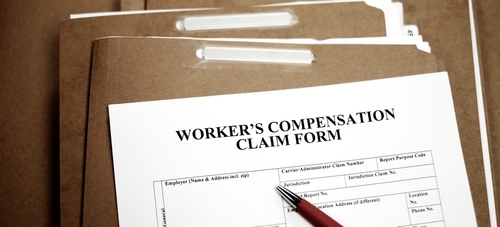Workers Comp Claim Denied in Georgia? Your Guide to Appeals and Legal Help
Navigating the complexities of a workers comp claim denied in Georgia can be incredibly frustrating — especially when you’re already dealing with the pain and stress of a workplace injury. It’s a situation no one wants to find themselves in, but unfortunately, many valid claims are initially denied. If your insurance denied your work injury claim, know that you’re not alone, and that denial isn’t the end of the road.
Filing the correct application forms, such as the ‘Application for Adjustment of Claim’, is crucial to adhere to state laws and deadlines, and to avoid claim denials.
Our team of experienced attorneys understands how overwhelming a workers comp claim denied in Georgia case can feel. With deep knowledge of Georgia workers compensation appeals and a strong record of success, we’re here to guide you through the next steps and fight for the benefits and medical care you deserve.
Whether you’re unsure what to do if workers comp is denied, or you’re ready to take legal action, this page will walk you through everything you need to know — including what you can do right now to strengthen your case, and how a skilled lawyer can help you appeal, prepare, and win.
The Frustration of a Denied Claim
A claim denial can feel like a personal attack — especially when you’ve followed every rule, seen an approved doctor, and reported the work-related accident on time. The reality is, reasons workers comp gets denied vary. It could be missing paperwork, an insurance company looking to cut costs, questions about whether your injury happened at work, or even a pre-existing condition being used against you.
Effectively presenting the facts surrounding your injury is crucial to support your claim.
But here’s the truth: a denial is not final.
What You Can Do Next
If you’re wondering what to do if workers comp is denied, the first step is not to panic. The state’s workers compensation board plays a crucial role in the appeal process, assigning cases and outlining procedures for appealing a decision. You have the right to appeal a workers comp denial in GA, and there is a structured legal process in place to challenge the decision. This includes filing an appeal with the state’s workers compensation board, gathering additional medical records, and possibly attending a workers comp hearing in Georgia.
What Your Lawyer Will Do
This is where a skilled advocate makes all the difference. An attorney experienced in appealing a workers comp denial in GA will handle every aspect of your case — from reviewing your denial letter, collecting the necessary medical evidence, representing you at the hearing, and fighting to prove your claim is valid. We know how a workers comp lawyer can help because we’ve helped hundreds of injured workers navigate this very situation. It is strongly recommended to hire an attorney to increase the likelihood of a successful outcome.
When you work with us, you’re not just getting legal support — you’re getting peace of mind, strategic guidance, and a real partner in your recovery.
Why Workers Compensation Claims Get Denied in Georgia
Understanding why your workers comp claim was denied is crucial for moving forward. Here are the common reasons for denied claims in Georgia:
Missed Deadlines
One of the most frequent reasons for a denied workers compensation claim is missed deadlines. In Georgia, you must report your injury to your employer within 30 days. If you fail to file your claim within one year, you may lose your right to benefits.
Disputed Cause of Injury
Insurance companies often dispute the cause of an injury. They may argue that your injury did not occur while you were performing work-related duties. Timely reporting of injuries that occur while employees are performing their jobs is crucial to ensure proper documentation and support for your claim. This can happen if there is insufficient evidence proving, in fact, that your injury is primarily caused by your job.
Lack of Medical Evidence
A lack of medical documentation can lead to a claim denial. You must provide thorough medical records that clearly show your injury and its relation to your work. Without this evidence, insurers may deny your claim.
Pre-existing Conditions
If you have a pre-existing condition, the insurance company might deny your claim, arguing that your injury is not work-related. They may claim that your current condition is a result of your previous health issues rather than your job.
Alleged Misconduct
Claims can also be denied if the insurer believes you were involved in misconduct. This includes instances of drug or alcohol use at the time of the injury or engaging in horseplay. If the insurance company suspects any wrongdoing, they may deny your claim.
Recognizing these reasons can help you understand the denial and prepare for the next steps in the appeals process.
First Steps to Take After a Denied Claim
Receiving a denial letter for your workers compensation claim can be frustrating. However, it’s important to stay calm and take proactive steps. Many valid claims are denied initially, but you can often reverse the decision with the right approach.
Carefully Review the Denial Letter
Start by closely examining the denial letter. This document outlines the reasons for the denial. Common reasons include missed deadlines, disputed causes of injury, or insufficient medical evidence. Most workers are covered by workers’ compensation systems, with some exceptions such as contractors and seasonal workers. Understanding these reasons will help you address the issues effectively. Timely reporting is crucial to ensure that claims are not denied, as delays can negatively impact the outcome of a worker’s claim.
Don’t Panic — Denials Can Often Be Reversed
A denied workers’ comp claim does not mean the end of your pursuit for benefits. Many claims get denied due to minor issues that can be corrected. Stay focused on the next steps to improve your chances of a successful appeal.
Gather Supporting Medical Documentation
Collect all relevant medical records related to your injury. This includes doctors’ notes, treatment plans, and any test results. Strong medical documentation can help prove the validity of your claim and counter the reasons for denial. It is also crucial to consult with a professional in-network medical care provider to avoid claim rejection.
Avoid Speaking to the Insurer Without Legal Counsel
Do not engage with the insurance adjuster without consulting your attorney first. Conversations with them can unintentionally harm your case. An experienced workers’ compensation lawyer can guide you in these discussions and protect your rights.
Taking these steps can set you on the right path to appealing your denied workers’ compensation claim in Georgia.
How to Appeal a Workers Comp Claim Denied in Georgia
If your workers’ compensation claim is denied in Georgia, you have the right to appeal. Understanding the steps involved in the appeals process is crucial to securing the benefits you deserve. Here’s how to navigate the appeal effectively.
Filing a WC-14 Form with the Georgia State Board of Workers’ Compensation
The first step in appealing a denied claim is to file an application using the WC-14 form. This form notifies the Georgia State Board of Workers’ Compensation (SBWC) that you wish to contest the denial. The state’s workers compensation board assigns cases and oversees the procedures involved in appealing a decision, making it crucial to adhere to state-specific timelines. You must submit this form within one year from the date of the injury or the date of the denial. Ensure that you fill out the form completely and accurately to avoid any delays.
Requesting a Hearing Before an Administrative Law Judge
Once the WC-14 form is filed, you can request a hearing before an Administrative Law Judge (ALJ). This hearing is essential for presenting your case. You will need to provide evidence supporting your claim, such as medical records and witness statements. The hearing will take place at a designated location, and both you and your employer’s insurance company will have the opportunity to present your arguments.
What Happens at the Hearing
During the hearing, the ALJ will listen to both sides. You will present your evidence and may have witnesses testify on your behalf. The insurance company will also present its case, often arguing why the claim should remain denied. The ALJ will ask questions to clarify any points. After reviewing all the evidence, the ALJ will make a decision.
Timeline of the Appeals Process
The timeline for the appeals process can vary. Generally, after filing the WC-14 form, you can expect a hearing to occur within a few months. The ALJ will issue a decision shortly after the hearing, typically within 30 days. If you disagree with the ALJ’s decision, you can further appeal to the Appellate Division of the SBWC. This additional step may extend the timeline, so it’s essential to stay informed and proactive throughout the process.
By following these steps and understanding the appeals process, you can effectively challenge a denied workers’ compensation claim in Georgia. If you need assistance, consider consulting with a knowledgeable attorney who specializes in workers’ compensation cases. They can guide you through each step and help strengthen your appeal.
What a Workers’ Compensation Attorney Will Do For You
With a denied workers compensation Georgia claim, a skilled attorney can play a crucial role in your appeal process. Here’s how they can assist you:
Review Your Denial and Identify Weak Points
Your attorney will carefully examine the denial letter to understand the reasons behind the insurance company’s decision. They will identify any weaknesses or inaccuracies in the insurer’s case. This analysis is vital for building a strong argument for your appeal.
Gather Medical Records, Witness Statements, and Expert Opinions
A successful appeal often hinges on solid evidence. Your attorney will collect all necessary medical records that demonstrate the extent and cause of your injuries. They may also gather witness statements from colleagues or experts who can support your claim. Consulting with a professional in-network medical care provider is crucial to avoid claim rejection. This evidence is essential in proving that your injury is work-related and justifies the benefits you seek.
Represent You at Your Hearing
If your appeal requires a hearing, your attorney will represent you before an Administrative Law Judge (ALJ). They will present your case, argue on your behalf, and counter any arguments made by the insurance company. Their experience in handling similar cases can significantly impact the outcome of your hearing.
Negotiate a Favorable Settlement if Possible
In many cases, your attorney can negotiate directly with the insurance company to reach a settlement. This can save time and provide you with the benefits you need sooner. A skilled negotiator can often secure a better settlement than you might achieve on your own.
Help You Avoid Mistakes that Could Harm Your Appeal
Navigating the appeals process can be complex. Your attorney will guide you through each step, helping you avoid common pitfalls that could weaken your case. They will ensure you meet all deadlines and comply with legal requirements, increasing your chances of a successful appeal.
In summary, hiring a workers’ compensation attorney can greatly improve your chances of overturning a denied claim. Their expertise can help you gather the necessary evidence, represent you effectively, and negotiate a fair settlement. If you find yourself facing a workers comp claim denied in Georgia, consider reaching out to an experienced attorney to assist you in this process.
How Long Does It Take to Resolve a Denied Claim?
When dealing with a denied workers’ compensation claim in Georgia, understanding the timeline for appeal and resolution is crucial. The process can vary based on several factors, but knowing what to expect can help you navigate this challenging situation.
Typical Timeframes for Appeal and Resolution
The appeals process for a workers comp claim denied in Georgia generally takes several months. After you file the WC-14 form, the Georgia State Board of Workers’ Compensation (SBWC) will schedule a hearing. This hearing typically occurs within 30 to 90 days after filing. However, the entire resolution process can take anywhere from three to six months or longer, depending on the specifics of your case.
Factors That Affect Delays
Several factors can influence the timeline of your appeal:
- Complexity of the Case: If your case involves multiple medical issues or disputes over the cause of your injury, it may take longer to resolve.
- Availability of Evidence: Delays can occur if obtaining necessary medical records or witness statements takes time.
- Scheduling Conflicts: The availability of the Administrative Law Judge (ALJ) and involved parties can impact how quickly your hearing is scheduled.
- Insurance Company Response: The speed at which the insurance company responds to requests for information can also affect the timeline.
Nearly half of individuals who received settlements faced initial claim denials.
When Settlements Are Possible vs. Going to Trial
In many cases, settlements can occur before the hearing. If both parties reach an agreement, the process can conclude more quickly. However, if a settlement cannot be reached, the case will proceed to the hearing.
If your claim is still denied after the hearing, you may appeal to the Appellate Division of the SBWC. This further appeals process can add additional time, often extending the resolution timeline by several months.
Understanding these timeframes helps set realistic expectations and allows you to plan your next steps effectively.
Potential Benefits If Your Appeal Is Successful
If your appeal for a denied workers’ compensation claim in Georgia is successful, you can access several important benefits. Understanding these benefits can motivate you to pursue the appeals process.
Financial Compensation
One of the primary benefits of a successful appeal is financial compensation. This includes coverage for medical expenses related to your work-related injury. You can receive payment for:
- Doctor visits
- Hospital stays
- Medications
- Rehabilitation services
Additionally, you may receive compensation for lost wages. This covers the income you missed while unable to work due to your injury.
Ongoing Medical Treatment
A successful appeal can ensure that you continue to receive necessary medical treatment. Workers’ compensation can cover ongoing care, including physical therapy, surgeries, and follow-up appointments. This support is crucial for your recovery and return to work.
Vocational Rehabilitation
If your injury prevents you from returning to your previous job, a successful appeal may also provide access to vocational rehabilitation services. These services can assist you in:
- Finding new employment
- Retraining for a different job
- Developing new skills
This support can help you regain financial independence and stability.
Peace of Mind
Winning your appeal can bring peace of mind. Knowing that you have access to the benefits you deserve can reduce stress during your recovery. It allows you to focus on healing rather than financial worries.
Legal Fees Covered
In some cases, if your appeal is successful, the insurance company may be required to cover your legal fees. This can ease the financial burden of hiring an attorney to help with your case.
Navigating the appeals process for a denied workers’ compensation claim can be challenging, but the potential benefits are significant. From financial compensation to ongoing medical treatment and vocational support, a successful appeal can make a positive impact on your recovery and future. If you face a denied claim, consider working with an experienced workers’ compensation attorney to improve your chances of success.
Continuing Medical Treatment During the Appeals Process
After a denied workers’ compensation claim in Georgia, continuing medical treatment is crucial for your recovery and your case. Here’s how to approach this important step.
Importance of Ongoing Medical Care
Continuing medical treatment is essential for several reasons. First, it ensures you receive the care needed for your work-related injury. Regular medical visits help document your condition and show that you are actively seeking treatment. This documentation can support your appeal and strengthen your case.
Communicate with Your Healthcare Provider
Stay in close contact with your healthcare provider. Inform them about your denied claim and any changes in your condition. They can provide updated medical records that reflect your ongoing treatment and recovery efforts. These records are vital evidence when appealing your claim.
Document Everything
Keep thorough records of all medical appointments, treatments, and medications. Note any changes in your symptoms and how they affect your daily life. This information can help illustrate the impact of your injury and support your appeal.
Consider In-Network Providers
If your workers’ compensation claim is denied, you may still receive treatment from in-network providers. Check with your insurance company about coverage options and ensure you follow their guidelines. This can help avoid additional costs while you pursue your appeal.
Seek Legal Guidance
Consulting with a workers’ compensation attorney can provide clarity on your rights regarding medical treatment. They can guide you on how to navigate the system effectively while you continue to seek care. Having legal support can also ensure that your treatment is documented correctly for your appeal.
Continuing medical treatment during the appeals process is vital for your recovery and your case. Stay proactive in your care, communicate with your healthcare provider, and keep detailed records. With the right approach, you can strengthen your appeal and work towards a successful resolution of your denied workers’ compensation claim in Georgia.
Possible Outcomes of the Appeals Process
After you appeal a denied workers’ compensation claim in Georgia, several outcomes may arise. Understanding these outcomes can help you prepare for the next steps in your case.
Approval of Your Claim
If the Administrative Law Judge (ALJ) rules in your favor, you may receive approval for your workers’ compensation benefits. This outcome means you will be entitled to compensation for medical bills, lost wages, and other related expenses. The insurer must comply with the ruling and provide the benefits you deserve.
Partial Approval
In some cases, the ALJ may grant partial approval. This means the judge may agree with certain aspects of your claim while denying others. For example, you might receive compensation for medical treatment but not for lost wages. Understanding the details of the partial approval is crucial for your next steps.
Denial of Your Appeal
If the ALJ denies your appeal, you still have options. You can appeal the decision to the Appellate Division of the Georgia State Board of Workers’ Compensation. This process involves submitting additional documentation and possibly presenting your case again.
Settlement Negotiations
Sometimes, after an appeal, the insurer may approach you for settlement negotiations. This can happen if the insurer believes the ALJ may rule in your favor. A settlement can provide a lump sum payment, which may be beneficial to avoid further legal proceedings.
Further Appeals
If your claim is denied at the Appellate Division, you can escalate the matter to the Superior Court or higher courts. This process can be lengthy and complex, but it is essential if you believe your claim has merit. Engaging an experienced workers’ compensation attorney will be critical during this stage.
The appeals process can lead to various outcomes, each with its implications. Whether you receive approval, partial approval, or face denial, understanding your options empowers you to take informed action. Working with a knowledgeable attorney can help you navigate these outcomes effectively and increase your chances of a successful appeal. Many individuals share a common story of initial claim denials, but with persistence and legal assistance, they eventually secure their benefits, highlighting the importance of not giving up.
Tips for Strengthening Your Claim During the Appeal
When your workers compensation claim is denied in Georgia, it is essential to take proactive steps to strengthen your case during the appeal process. Here are some practical tips to help you improve your chances of a successful outcome.
1. Review the Denial Letter Carefully
Start by thoroughly examining the denial letter from your insurance company. This letter outlines the reasons for the denial. Understanding these reasons will help you address specific issues in your appeal. Common reasons for denial include lack of medical evidence, missed deadlines, or disputed claims about the cause of the injury.
2. Gather Comprehensive Medical Documentation
Collect all relevant medical records related to your injury. This includes:
- Initial treatment records
- Follow-up appointments
- Diagnostic tests and results
- Reports from specialists
Ensure that these documents clearly establish the connection between your injury and your work. Detailed medical evidence can significantly strengthen your appeal.
3. Obtain Witness Statements
If there were witnesses to your injury or the events leading up to it, ask them to provide written statements. These statements can help corroborate your account of the incident and support your claim that the injury occurred at work.
4. Seek Expert Opinions
In some cases, obtaining an expert opinion from a medical professional can bolster your claim. An expert can provide insights into the nature of your injury and its relation to your job duties. This testimony can be crucial in proving that your injury is work-related.
5. Document All Communications
Keep a detailed record of all communications with your employer, insurance company, and medical providers. This includes emails, phone calls, and in-person meetings. Having a clear timeline of events can help clarify any misunderstandings and provide context for your appeal.
6. Follow Up on Your Claim Regularly
Stay in touch with your attorney and the workers compensation board. Regular follow-ups can help ensure that your appeal is progressing and that you are aware of any additional information needed to support your case.
7. Consult an Experienced Workers’ Compensation Attorney
Working with a knowledgeable attorney can significantly enhance your appeal. An experienced workers compensation lawyer understands the nuances of Georgia’s laws and can guide you through the appeals process. They can help you gather evidence, prepare for hearings, and negotiate with the insurance company.
By following these tips, you can strengthen your workers compensation claim during the appeal process. Taking proactive steps can improve your chances of receiving the benefits you deserve.
Choosing an Experienced Georgia Workers’ Compensation Lawyer
When your workers compensation claim is denied, it can feel overwhelming. However, working with The Law Offices of Humberto Izquierdo, Jr., PC, an experienced Georgia workers’ compensation law firm, can make a significant difference in your case. Here’s why hiring the right attorney is crucial.
Understanding Workers’ Comp Laws
An experienced attorney knows Georgia’s workers compensation laws inside and out. They can explain your rights and the benefits you are entitled to. This knowledge is vital in navigating the complexities of your case.
Evaluating Your Claim
A skilled lawyer will review your denial letter and identify the reasons for the denial. They can pinpoint weaknesses in the insurer’s case and determine if there are grounds for an appeal. This assessment can strengthen your position significantly.
Gathering Evidence
Your attorney will help gather necessary evidence to support your claim. This includes obtaining detailed medical records, witness statements, and expert opinions. Solid evidence is essential for a successful appeal.
Representing You at Hearings
If your case goes to a hearing, having a lawyer by your side is crucial. They will represent you before the Administrative Law Judge (ALJ) and present your case effectively. Their experience in handling similar cases can enhance your chances of a favorable outcome.
Negotiating Settlements
An experienced attorney can negotiate with the insurance company on your behalf. They understand the tactics insurers use and can work to secure a fair settlement. This negotiation can save you time and stress.
Avoiding Common Mistakes
Navigating the appeals process can lead to mistakes that may hurt your case. An attorney can guide you in avoiding these pitfalls. They will ensure that you meet all deadlines and follow proper procedures.
Free Case Review
Many Georgia workers compensation lawyers offer free consultations. This allows you to discuss your case and understand your options without any financial commitment. It’s a great opportunity to find the right lawyer for your needs.
In summary, if you experienced a workers comp claim denied in Georgia, don’t lose hope. An experienced Georgia workers’ compensation lawyer from The Law Offices of Humberto Izquierdo, Jr., PC can provide the support and expertise you need to appeal the decision successfully. Contact us for a free case review today (770) 888-8901







